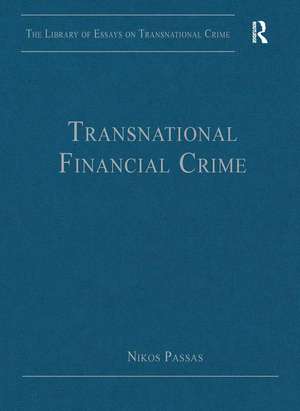Transnational Financial Crime: The Library of Essays on Transnational Crime
Editat de Nikos Passasen Limba Engleză Hardback – 20 noi 2013
Preț: 1974.16 lei
Preț vechi: 2806.05 lei
-30% Nou
Puncte Express: 2961
Preț estimativ în valută:
377.76€ • 395.41$ • 314.41£
377.76€ • 395.41$ • 314.41£
Carte tipărită la comandă
Livrare economică 31 martie-14 aprilie
Preluare comenzi: 021 569.72.76
Specificații
ISBN-13: 9781409448884
ISBN-10: 1409448886
Pagini: 656
Dimensiuni: 169 x 244 x 47 mm
Greutate: 1.18 kg
Ediția:1
Editura: Taylor & Francis
Colecția Routledge
Seria The Library of Essays on Transnational Crime
Locul publicării:Oxford, United Kingdom
ISBN-10: 1409448886
Pagini: 656
Dimensiuni: 169 x 244 x 47 mm
Greutate: 1.18 kg
Ediția:1
Editura: Taylor & Francis
Colecția Routledge
Seria The Library of Essays on Transnational Crime
Locul publicării:Oxford, United Kingdom
Cuprins
Contents: Introduction; Part I Theoretical Frameworks: Globalization, criminogenic asymmetries and economic crime, Nikos Passas; Global anomie, dysnomie, and economic crime: hidden consequences of neliberalism and globalization in Russia and around the world, Nikos Passas; Enron et al: paradigmatic white collar crime cases for the new century, David Friedrichs; Criminogenic cyber-capitalism: Paul Virilio, simulation, and the global financial crisis, Eric Wilson; Counterfeiting as corporate externality: intellectual property crime and global insecurity, Simon Mackenzie. Part II Types of Transnational Financial Crime: A good century for tax? Globalisation, redistribution and tax avoidance, John Braithwaite; E-gaming and money laundering risks: a European overview, Michael Levi; Trade-based money laundering and terrorist financing, John S. Zdanowicz; Demystifying Hawala: a look into its social organization and mechanics, Nikos Passas; Financial crime, near crime, and chicanery in the Wall Street meltdown, Richard B. Freeman; Mortgage origination fraud and the global economicl crisis: a criminological analysis, Tomson H. Nguyen and Henry N. Pontell; Odious debt, odious credit, economic development and democratization,Tom Ginsberg and Thomas S. Ulen; Defence expenditures, arms procurement and corruption in sub-Saharan Africa, Susan Willett; Why do so many anti-corruption efforts fail?, Michael Johnston; The genesis of the BCCI scandal, Nikos Passas; Organized fraud and organizing frauds: unpacking research on networks and organization, Michael Levi; Crime on the line: telemarketing and the changing nature of professional crime, Neal Shover, Glenn S. Coffey and Dick Hobbs; The insurgent economy: black market operations of guerrilla organizations, R.T. Naylor; Addressing identity crime in crime management information systems: definitions, classification, and empirics, Rodger Jamieson, Lesley Pek Wee Land, Donald Winchester, Greg Stephens, Alex Steele, Alana Maurushat and Rick Sarre; Transnational organised cyber crime: distinguishing threat from reality, Rob McCusker; Intellectual capital and economic espionage: new crimes and new protections, Herbert Snyder and Anthony Crescenzi; Cross-border crime and the interface between legal and illegal actors, Nikos Passas. Part III Control Issues: Criminalizing consequences of sanctions: embargo busting and its legacy, Peter Andreas; Financial controls and counter-proliferation of weapons of mass destruction, Nikos Passas; Balancing financial threats and legal interests in money-laundering policy, Petrus C. van Duyne, Marc S. Groenhuijsen and A.A.P. Schudelaro; Do European procurement rules generate or prevent crime?, Nicholas Dorn, Michael Levi and Simone White; Criminal profits, terror dollars, and nonsense, R.T. Naylor; Asset and money laundering in Bolivia, Colombia and Peru: a legal transplant in vulnerable environments?, Francisco E. Thoumi and Marcela Anzola; Testing the global financial transparency egime, J.C. Sharman; Name index.
Notă biografică
Nikos Passas is Professor in the School of Criminology and Criminal Justice at Northeastern University, USA.
Descriere
Financial crime affects virtually all areas of public policy and is increasingly transnational. The essays in this volume address both the theoretical and policy issues arising from financial crime and feature a wide variety of case studies, and cover topics such as money laundering, terrorism, proliferation of WMD, sanctions, third-world debt, procurement, telecommunications, cyberspace and intellectual property. Taken together, these essays form a must-read collection for scholars and students in law, finance and criminology.




